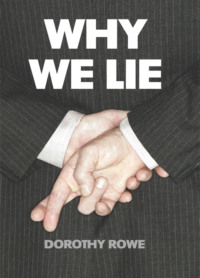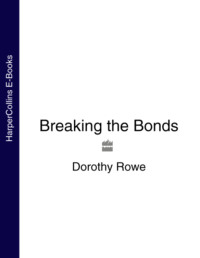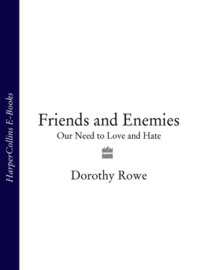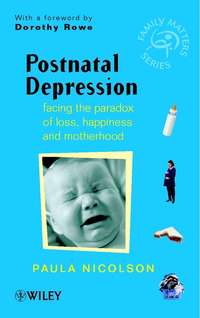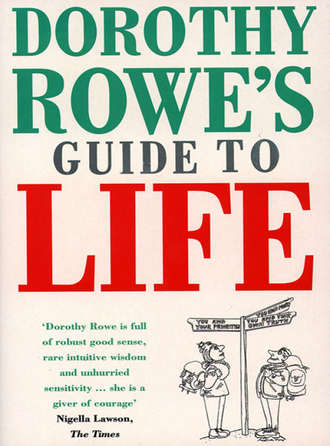
Полная версия
Dorothy Rowe’s Guide to Life

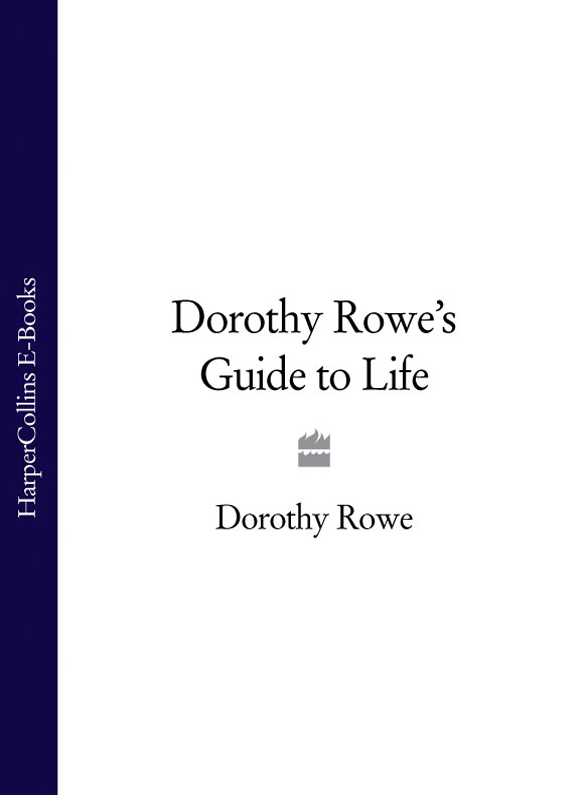
DOROTHY ROWE
Guide to Life

Dedication
To my publisher and friend
Mike Fishwick
Epigraph
Some five hundred years before the birth of Christ the Greek poet Xenophanes wrote,
The gods did not reveal, from the beginning,
All things to us; but in the course of time,
Through seeking we may learn, and know things better.
But as for certain truth, no man has known it,
Nor will he know it; neither of the gods,
Nor yet of the things of which I speak.
And even if by chance he were to utter
The final truth, he would himself not know it;
For all is but a woven web of guesses.1
Albert Einstein wrote,
As far as the laws of mathematics refer to reality, they are not certain; and as far as they are certain, they do not refer to reality.2
Contents
Cover
Title Page
Dedication
Epigraph
1 The Secret of Life
2 Life – What You Can’t Change and What You Can
3 You and Your Own Truth
4 You and What ‘You’ Is
5 You and How You Feel About Yourself
6 You and Tour Priorities
7 You and Your Life Story
8 You and Death
9 You and Depression
10 You and Other People
11 You and Emotion
12 You and Power
13 Is It All Your Fault?
14 You and Communication
15 You and the World
16 You and Time
17 Living Your Own Life
18 If You Want to Learn More
Notes
Index
Acknowledgements
About the Author
Praise for Dorothy Rowe:
By the Same Author
Copyright
About the Publisher
CHAPTER 1 The Secret of Life
THE SECRET of life is that there is no secret.
All that you need to know about life is there for you to see. All you have to do is open your eyes and recognize what you already know.
However, down the centuries, many people wanting power have tried to keep the secret. They have created their theories and their jargon, and told us that they and they alone know the secret of life. These are the people who have claimed to be the wisest of the wise. They have called themselves philosophers, theologians, clergy, doctors, psychiatrists, psychologists, psychotherapists, counsellors – in short, experts on life and living. Jungians say we are all part of the collective unconscious, while psychiatrists say that we are the product of our genes. Each of these theories is a way of describing and explaining certain parts of human experience, but no one theory can describe, let alone explain it all.
Some of these people have always known that there is no secret, while others have insisted that they and they alone know the Secret Truth About Life.
Down the centuries a few of these experts have dared to reveal that there is no secret, and, consequently, have been reviled by their colleagues. How dare such renegades say that each of us can sort things out for ourselves! How dare they threaten the experts’ power, prestige and wealth!
The experts always protect themselves by forming themselves into an elite and guarding the entrance with a formidable barrier of examinations and rituals through which only a chosen few can pass.
When the selected few do get through the barrier they are faced with a choice. Do you now tell yourself that you are initiated into the Secret Truth About Life? Or do you bear the disappointment of your discovery that what you might have is simply a collection of useful research results (for instance, we now know that babies are born with the ability to distinguish faces from all other phenomena) and, if you look for it, the kind of wisdom in living which has always been available to every generation.
Amongst the experts this wisdom has been more known than used. On the whole, the personal lives of experts are far from edifying. Some experts do live wisely but most (I’m speaking from years of observation) manage their lives no better than the rest of us. They’ve been so busy being experts they haven’t learnt what they need to know.
The secret which is no secret is that there is a body of knowledge which concerns how to live wisely. This wisdom is available to all of us. You don’t need a brilliant intelligence and a superb education to understand it, absorb it and use it.
However, just as we are all born artists, musicians, mathematicians and explorers and our upbringing and education take most of these abilities away from us, so we are born with the ability to understand ourselves and life, and the adults around us pour scorn on this ability and forbid us to use it. In learning to be good, obedient members of society we lose touch with the knowledge we need if we are to live our lives in ways which are rich and fulfilling.
A rich and fulfilling life is not one of unalloyed happiness. No amount of wisdom can defend us from loss, disappointment, old age and death, nor from the idiocies committed by those who have political and economic power.
However, such wisdom does ensure that we can live comfortably with ourselves and with other people. Being comfortable with yourself means that you are not forever thinking about and worrying about yourself, always prey to difficult and unpleasant emotions. Being comfortable with other people means that you are not afraid of others but can enjoy their company. There’s no longer a barrier between you and other people. No longer burdened with the sense of your own inadequacies, you cease to see the world as a cold, evil, disappointing place and instead become aware of the world’s infinite possibilities.
What follows here is not a list of Absolute Truths. The way we are physically constituted means that if there are any Absolute Truths in the universe we could not recognize one even if we stumbled over it. What we have are relative truths, conclusions we have drawn from our experience and which are always relative to our past experience and the situation in which we find ourselves.
We each have our own relative truths, and if we compare notes we can see that some of us have arrived at much the same relative truths. This suggests that perhaps we have managed to approximate that kind of relative truth which, in a random universe, turns up fairly frequently. We can then decide, if we were laying a bet, on which of these truths we would put our money.
Writing this kind of book creates for me the problem of which of the personal pronouns I should use. Should I say ‘them’ or ‘us’, ‘me’ or ‘you’?
Using ‘they’ and ‘them’ puts a distance between them and us (my reader and me) and sometimes I want to do this.
I use ‘we’ and ‘us’ when I’m talking about something which everybody is likely to do at some time or other.
I use ‘I’ and ‘me’ when I’m talking about some part of my own experience which may or may not be like that of other people.
When I use ‘you’ and ‘your’ I don’t mean that you, my dear reader, have had all the experiences or think in all the different ways which I am describing. No person could live so long or be so changeable. I am simply assuming that with some of my anecdotes about ‘you’ you will feel an identity. Others of these anecdotes are an invitation for you to make a leap of imagination into someone else’s world. ‘Ah, yes,’ you might think, ‘that reminds me of so-and-so. Is that what he thinks? I wonder.’
Understanding yourself and understanding other people are exactly the same process.
CHAPTER 2 Life – What You Can’t Change and What You Can
WHEN YOU think about your life, do you feel that you are as you are, the world is as you see it, your past was what it was, your present is what it is, and your future will be very much what you expect it to be?
Do you feel that although some parts of you, your life and the world can change, you, your life and the world are, in essence, fixed?
Do you feel that you are as you are, your life is what it is, and the world is what it is?
Do you feel that in knowing yourself, your life and the world, you know what reality is?
Do you feel that you, your life and the world are your fixed, unalterable fate? They are as they are, and they are your lot. They are reality.
If this is what you feel, then you are mistaken.
You, your life and the world are not fixed, unalterable parts of reality which you have to put up with and cope with as best you can. What you see as being you, your life and the world is not reality. You, your life and the world are matters that you can change.
What you see as you, your life and the world are the set of conclusions you have drawn from your experience of life which began when you were a tiny babe tucked in your mum’s womb and your growing brain, like the hardware in a computer, got to the stage where it could run your software, commonly called your mind or, less commonly, your ‘meaning structure’.
To describe what I mean by a meaning structure I have used the analogy of a computer, but this is quite inadequate because our brains can do much more than the most advanced computer can.
A computer’s hardware is built and then the software, which someone has constructed separately, is fed into it, whereas the hardware and the software of a brain develop together. Our brains come equipped with much more than what can be observed when a brain is dissected or scanned.
Our brains come equipped with tools which are there as potentialities until our interaction with the environment brings that potential into use. Thus before the potential of your tool of language could come into being and be used you had to have a language spoken around you and you had to be able to hear it.
Clever though these tools are, their function is not to reveal reality to you. They are not transparent windows on to the world. Instead, the tool’s function is to create a construction which represents some aspect of your experience. This construction is a meaning. If the language you learn to speak is English you’ll see the world in the way English creates it. If you learnt Latin or Spanish or Italian or were born in the West Indies you’ll see the world differently.
A study of the derivation of words will show just how diversely different languages ‘see’ the world. The word ‘dawn’ comes from the Old English daeg, ‘day’, and dagian, ‘to become light’.3 Ancient Romans saw dawns where ‘the air grows golden’, hence aurora from aurum, gold. Spaniards and Italians saw a white dawn, alba, ‘the white’. Out of African languages dawn in the West Indies became ‘day clean’ and cock crow ‘Gi me trousers’.4
When, shortly after birth, your eyes open, you seem to be surrounded by a blur of events. Then one of your tools comes into operation – the tool of contrast. With this tool some parts of the blur look different from other parts. You start to see patterns. For the rest of your life you will continue to see patterns, even where no patterns actually exist. You’ll hear patterns and learn to call the clearly structured patterns you hear ‘language’ or ‘music’ and the less clearly structured ‘noise’. You’ll also learn to feel patterns, taste patterns and smell patterns.
Within a day or so one of these patterns which you see becomes very significant though as yet you don’t know why. Your tool of face recognition has come into operation and a few days later you know, though you haven’t the words to say it, That’s my mum.’
Aren’t you clever? That’s because
The function of your brain is to create meaning.
You could ask, ‘Isn’t the function of the brain to keep the body alive?’
I would say, ‘This is the meaning for the brain which many people now use because this meaning seems to give useful results. But it’s only recently in human history that the brain has been given this meaning. In other times and cultures other organs of the body – the heart, the stomach and the bowels – have been given the meaning of being the most important organ. Current research on genes and DNA suggest that it’s our genes that have the primary importance. No doubt there are genes which enable our brain to create meaning.’
At the moment of conception the brain starts developing and at some point (current research suggests at about 18 weeks’ gestation) meaning starts to be created.
Note that I did not say, ‘You start creating meaning.’
There is no YOU sitting inside your brain creating meaning.
Or at least I hope there isn’t, because then I’d have to work out how little you-inside-your-brain creates meaning and if little you has a littler you inside and so on and so on to an infinity of you’s.
So let’s stick with your brain creating meaning.
Now I’m going to abandon the computer metaphor and turn to Lego.
For those of you bereft of children I shall explain that Lego is a toy made up of plastic blocks of all shapes and sizes but all with a regular pattern of circular indentations and raised rings. The rings on one block fit into the indentations of another, thus allowing all sorts of structures to be built. However, if you imagine your brain being made of blocks of Lego the difference would be that this brain Lego is infinitely flexible so that every part can be attached simultaneously to every other and can reform itself to accommodate any new part that arrives on the scene.
This happens often, because your Lego/brain has many tools which, sometimes working together and sometimes working alone, create new pieces of Lego. Each piece of Lego is a meaning.
Your first piece of Lego/meaning, formed at some point after conception, probably had to do with pleasure and pain. Soon would follow Lego/meanings to do with sounds and pressure, and these would all link together. Ease of pressure would link to pleasure, harsh sounds to pain.
The linked pieces of Lego/meaning form a structure, hence the term meaning structure. This meaning structure constantly accommodates new pieces of Lego/meaning and reforms itself in the process. Encountering the outside world brings a constant, never-ending influx of changes, and at some point the meaning structure starts to call itself ‘I’.
You are your meaning structure. Your meaning structure is you.
If you like you don’t have to think of yourself as a set of flexible Lego. Perhaps you could think of another metaphor. A cell dividing and enlarging, with each new cell being a meaning, is another image I sometimes use.
One of our greatest problems is that the only way we can make sense of anything is in terms of our current meaning structure. We understand something new by seeing it as being like something we already know about. Whenever we encounter something which actually is so new to us that there is nothing in our meaning structure like it we find it hard to make sense of it. This is why keeping up with modern physics is so difficult. It is hard to imagine images like black holes and alternative universes, and even these images are likely to be quite inadequate in describing what is actually out there because the physicists have to rely on using images that already exist.
I use the Lego image as a way of explaining, first, that what all of us do all the time is to create meaning, and, second, that these meanings hang together and add up to an understanding of what we/our life/the world is.
The fact that you are in essence a meaning-creating creature is what you are stuck with and cannot change.
You cannot change the basic physical constituents of your body.
You cannot grow wings and fly.
You are a non-flying creature but you are a meaning-creating creature.
Your brain/hardware can grow, or suffer injury and decay, and your meaning structure constantly changes, but they are the constituents of your being and you cannot leave them.
You can imagine leaving your body, but this is just one of the amazing tricks your meaning structure can play.
Your meaning structure cannot show you what reality is. All your meaning structure can show you are your own pictures which represent what you think reality is. These pictures are actually inside your head, but your amazing brain and meaning structure persuade you that you are inside the pictures and that what you picture is real.
Presumably some kind of reality outside ourselves exists.
Some philosophers have argued that all that exists are our thoughts, but that seems nonsensical. Am I just imagining the paper I am writing on and you just imagining the book you’re reading? I’m sure that if you and I had simply imagined the universe and everything in it we wouldn’t have created the terrible things that happen in the world.
The evidence from our experience does seem to point to the existence of reality, the sum total of everything that exists. What this everything is is something we human beings can never know directly. We can only know it indirectly through careful judgement and thought.
Physicists talk about everything that exists as being made up of tiny particles which they give curious names like neutrino, charm, and quark. To large parts of everything that exists they give names like galaxy, nebula, solar systems and black holes.
They talk about these things as if they are reality, but when pressed physicists will explain they cannot possibly see reality.
Erwin Schrodinger wrote,
The world is a construct of our sensations, perceptions, memories. It is convenient to regard it as existing objectively on its own. But it certainly does not become manifest by its mere existence. Its becoming manifest is conditional on very special goings-on in very special parts of this world, namely on certain events that happen in a brain.5
We all make different kinds of observations, but these observations depend on where we are and what we expect to see. What we see and report is not reality but our interpretation of reality.
This is all that any of us can do.
We can never know reality directly.
All we can ever know are our interpretations of reality.
What you know as you, your life and the world is not reality. What you know as you, yourself and the world is your interpretation of you, your life and the world.
Seeing, hearing, touching, smelling, tasting are always, even at their very simplest, interpretations, just as intuitions are interpretations.
Interpretations are meanings.
We are always in the business of creating meanings.
This is what you cannot change.
You cannot not create meaning.
Imagine you’re sitting quiedy in your room and something happens. Your awareness of this happening is your interpretation. The beginning of your interpretation, entirely without words, is, say, ‘a very loud sound’. Immediately, before you stir from your seat to find out why the loud sound occurred, you give the sound a meaning. You might think it was an explosion, or a car crash, or a breaking window and so on. After interpreting the sound you might decide to check whether you were right.
You don’t have to be conscious to create meaning.
Even fast asleep, you interpret a happening as being in your body and you move to release your trapped arm, all without you waking.
It is our interpretations which determine how we think, feel and act.
Thus,
It’s not what happens to you that matters but how you interpret what happens to you.
You ALWAYS have a choice about how you will interpret what happens to you.
This applies even in the most extreme situations.
Suppose you are told that you have a particularly nasty form of cancer. How will you interpret this?
Some alternative interpretations are:
I won’t let this beat me.
This is the end.
This is God’s punishment for my wickedness.
If I’m a good patient the doctors will save me.
Conventional medicine is useless.
And so on.
Anyone who says, There is no alternative’ has merely rejected all other choices.
Interpretations are choices.
A friend who had had a Catholic upbringing and so saw herself, her life and her world as an unchangeable part of the Absolute, Eternal Truths of the Catholic Church told me that the best thing she got from therapy was learning that she had choices.
You can always change your choice.
You might initially interpret your illness as, ‘This is God’s punishment for my wickedness’ but later think, ‘That’s silly’ and decide upon, ‘I won’t let this beat me.’
Having made one interpretation you then interpret your interpretation.
Interpreting your illness as God’s punishment might lead you to further interpretations such as, ‘I deserve this punishment,’ or, ‘I must be good and accept my punishment and not do anything to get better.’ Deciding that your illness is a challenge to be mastered might lead you to interpret this as, ‘I’ll do everything I can to get better,’ or, ‘I’ll get on with my life as normal.’
Life has many paradoxes.
A paradox is not a problem.
A problem is a question which, in theory at least, is capable of being answered.
A paradox is a seeming contradiction which nevertheless contains an element of a truth.
A PARADOX OF LIFE
Even though we can never know reality directly, to survive and flourish we must always strive to make interpretations that are as close to reality as possible.
For instance, suppose you’re about to cross a busy road. You can’t possibly know the exact speed of approaching traffic, but to cross the road safely you must judge the speed of the traffic as accurately as possible. How do you make this judgement?
Suppose a friend who is a very successful stockbroker advises you to put your savings in shares that, he says, are sure to increase in value. How do you judge the likelihood that what he says is true?
We create new interpretations out of the interpretations we have already acquired. We have nothing else to use. We might decide not to bother with sorting through these old interpretations to create something new and just run out on to the road or impulsively give our money to the stockbroker. Or we might think carefully about our past experiences, contrasting one with another, and compare our past interpretations with our present observations to be as sure as we can that our new interpretation is as good an interpretation of reality as it can be. We can compare the speeds of a number of passing cars, or do some research about current stock prices.
Although we might know about many alternative ways of interpreting some aspect of reality, we each can have our own favourite way of interpreting that aspect.


